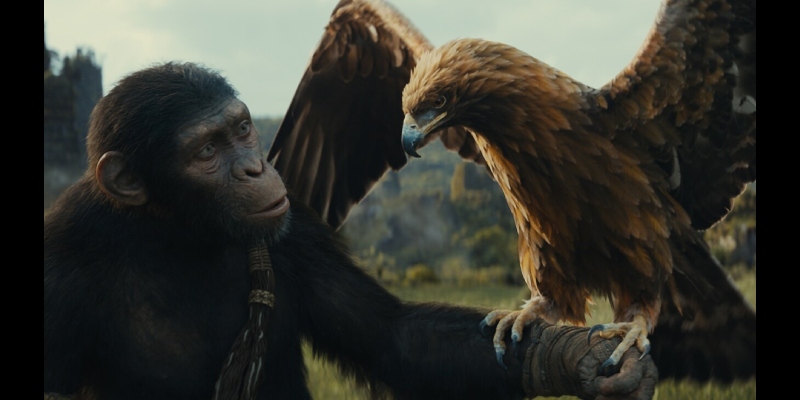
One of the common themes often witnessed in films are conflicts between human and other species – be it animals or aliens. But nothing is as memorable as the Planet of the Apes franchise (starting from 2011). Taking that franchise ahead is the fourth installment, Kingdom of the Planet of the Apes – and it stands true to its name.
The story is set “generations” after the death of Caesar, who was brilliantly portrayed by actor Andy Serkis in the first three parts of the film. Now, it is the kingdom of apes. They are the dominant species at this point in the story. But they, however, are fragmented into tribes, each with its own laws. While the apes evolved to be smarter (as shown in the previous films), the virus that spread around the world killing humans, mutated, and then degenerated the remaining living ones, robbing them of their speech and wit. Humans are few, mostly hiding, venture out only for food and water, and stay in groups. Apes and humans do not interact, both species wary of each other, threatened by each other’s existence.
The film plunges into action in the very beginning, introducing us to three dearest friends – Noa (played by Owen Teague), Soona (played by Lydia Peckham) and Anaya (played by Travis Jefferey) who climb to great heights to obtain an eagle egg. They belong to the Eagle Clan, a tribe that trains eagles, much like the Na’vi choosing their Ikran (from the film Avatar). But Noa’s happy life is devastated when another clan, ruled by an ambitious and (not quite) ruthless ape Proximus Caesar (played by Kevin Durand), destroy his home and colonise his clan. War for the Planet of the Apes is Caesar’s quest to free his species from a human military commander, and on similar lines is Noa’s mission, to free his clan members from the rule of Proximus.
While the story isn’t as engaging as the first three Planet of the Apes films, it touches upon multiple aspects – survival, morality, greed and the thirst for power. Much like in real life, the film shows how from a legendary ruler who taught his species unity, compassion and mercy, Caesar has turned into a mythical figure, revered by some and forgotten by most. And like every revered dead person, his words too are twisted to suit one’s need and fulfill one’s desire for conquest and domination. While the story lacks in building a conflict, it makes up in mounting the tension between humans and apes yet again. Banking on its previous films, the fourth part continues to establish humans as the species known for its selfishness when it comes to survival. While the several plot points in the film meander to dead ends, and the characters lack strength (in terms of writing and portrayal), Noa turns out to be endearing, especially because he seems to be a promising candidate for taking forward the legacy of Caesar. And there is also the orangutan Raka (played by Peter Macon), who is shown to be the last surviving member of a clan that has religiously (no pun intended) preserved and abided by all of the teachings of Caesar. Raka also is a fond remembrance of Maurice, the wise and compassionate orangutan companion of Caesar.
Aside from the story, there is the beautifully crafted world devoid of pollution, construction and anthropological disasters. The skyscrapers that are draped in vines, dilapidated structures that have been consumed by forests, broken bunkers and ships that are hardly recognisable, pristine beaches, deserted camps serving as hideouts – all speak for themselves. The visuals are not stark and meant to show off, but realistic scenes that breathe life into a story that is set several years after all the human activity has ceased. And add to that the immense motion capture work, for all the ape protagonists, who seamlessly interact with sand, water, mud, trees, each other as well as humans. Known for its work in the Avatar films, and now in Kingdom of the Planet of the Apes, WetaFX strengthens its position as the studio that crafts brilliance when it comes to creature work and motion capture.
Kingdom of the Planet of the Apes stays true to its franchise in creating a human-ape distrust, but lacks the life and wisdom that Caesar single-handedly brought to the previous films. It loosely tries to make up for him with quotes like “Ape together strong,” and Noa, who it seems will resemble Caesar more in the upcoming film – well yes, the end of the film apparently is not the end of this franchise.
In this installment there isn’t as much to gain or lose. However, once a Caesar-lover, always a Caesar-lover. Nothing can dampen that, not even this film.
20th Century Studios’s Kingdom of the Planet of the Apes is directed by Wes Ball (Maze Runner), written by Josh Friedman and based on characters by Rick Jaffa and Amanda Silver. It is now playing in theatres worldwide.

